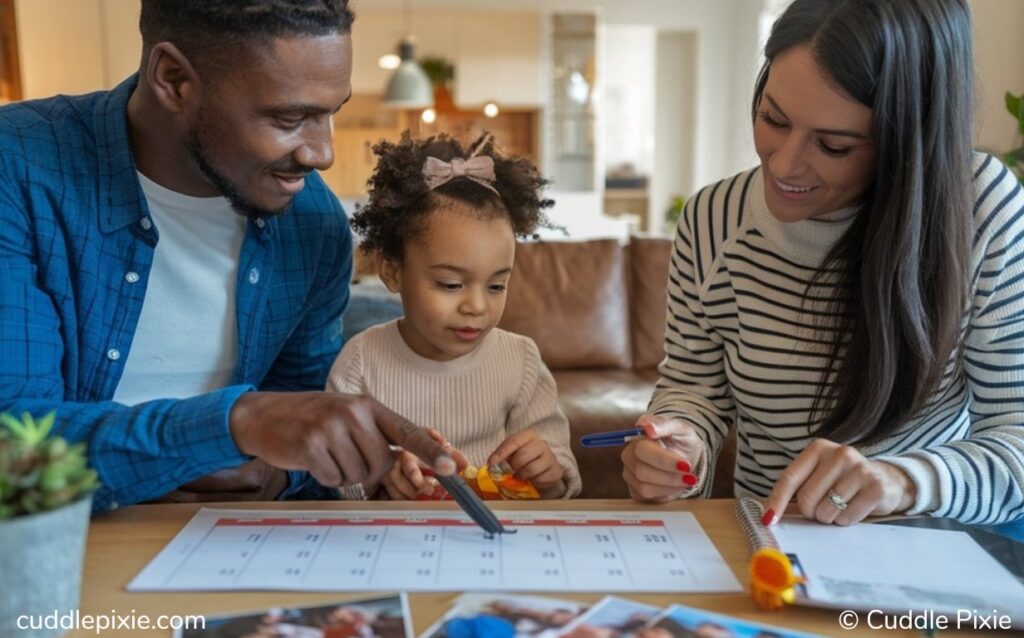Divorce is a life-changing event, not just for the couple but also for their children. After a divorce, the next challenge for parents is often navigating the complexities of co-parenting. Successful co-parenting isn’t just about dividing time; it’s about fostering a healthy environment where children can thrive, and both parents feel respected and supported in their roles. Research shows that children of parents who co-parent positively have better emotional and psychological outcomes, including improved self-esteem and reduced behavioral issues.
This comprehensive guide will explore expert-backed strategies for mastering positive co-parenting after divorce. With insights from licensed psychologists, family therapists, and legal experts, this article provides practical advice, real-life examples, and actionable steps to help you navigate co-parenting effectively.
In This Article
Understanding the Challenges of Co-Parenting After Divorce
Emotional Challenges
Co-parenting can be emotionally taxing. Resentment, anger, and grief often linger after a divorce, impacting how you communicate with your co-parent. Emotional triggers can cause conflicts that affect both the parents and the children.
Michelle King Rayfield, LMFT at Ocean Recovery notes, “Keeping conversations focused on the children and avoiding rehashing past grievances is crucial. By using clear, concise language and focusing on the future, rather than the past, you can maintain a respectful dialogue and minimize conflict.”
Additionally, Dr. Carolina Estevez, Psy.D., a licensed psychologist, suggests, “It’s essential to differentiate between your feelings toward your ex-partner and the co-parenting relationship. Even if there is lingering anger or hurt, the children’s well-being must come first. Co-parenting is a new chapter that requires a new approach, separate from the marital relationship.”
Logistical Challenges
Co-parenting involves significant logistical planning—coordinating schedules, managing finances, and maintaining consistency across two households. These practical challenges can be overwhelming, especially when both parents have differing approaches.
Michael Anderson, MA, LPC from Healing Pines Recovery recommends using shared calendars or co-parenting apps to minimize misunderstandings and miscommunications. “Tools like OurFamilyWizard or Cozi help keep everyone on the same page, ensuring that both parents are aware of important dates, appointments, and events,” he advises.
Psychological Impact on Parents and Children
The psychological toll of divorce and subsequent co-parenting disputes can significantly impact both parents and children. For parents, stress and anxiety can arise from conflicts and the need to adapt to new family dynamics. For children, the situation can be even more complex.
April Crowe, LCSW at Paramount Wellness Retreat emphasizes that “Positive co-parenting eliminates a huge amount of stress for children, fostering a nurturing environment essential for their emotional development.” Studies show that children exposed to parental conflict are more likely to develop anxiety, depression, and behavioral problems. Thus, reducing conflict through positive co-parenting strategies is essential.
Effective Communication Strategies for Co-Parents
Good communication is the backbone of effective co-parenting. It helps establish trust, resolve conflicts, and ensures that both parents remain aligned in their approach to raising their children.

Open, Honest, and Respectful Communication
Maintaining open and respectful communication is key to a successful co-parenting relationship. Conversations should focus on the children’s needs, not on past marital conflicts.
Steve Carleton, LCSW, CAS from Porch Light Health suggests, “Use ‘we’ rather than ‘I’ to show a united front. Avoid emotional language and stick to neutral, clear communication to prevent misunderstandings and conflicts.”
- Use Active Listening: Actively listen to your co-parent without interrupting. Acknowledge their perspective, even if you disagree. This can foster mutual respect and open dialogue.
- Employ “I” Statements: Frame concerns in a way that focuses on your feelings rather than blaming the other person. For example, say, “I feel concerned when…” rather than “You always…”
Use Technology Wisely
To avoid misunderstandings and keep a record of all communications, use co-parenting apps. These tools allow for scheduling, messaging, and sharing important information regarding the child.
Brittany Astrom, LMFT of OC Revive advises, “Apps provide a neutral ground for communication and help avoid heated exchanges. Keeping discussions child-focused and consistent is key to reducing conflict.”
Suggested Apps: Cozi, OurFamilyWizard, and 2Houses are popular apps that help with co-parenting coordination, communication, and expense tracking.
Set Clear Boundaries and Expectations
Establishing clear boundaries can help both parents understand their roles and responsibilities, reducing misunderstandings and conflict.
Dr. Michelle Dees, a board-certified psychiatrist, stresses, “Co-parents need to set clear boundaries regarding parenting time, decision-making, and communication. A written agreement or parenting plan can help prevent misunderstandings and provide clarity.”
- Define Roles and Responsibilities: Create a written agreement outlining who is responsible for what (e.g., pick-ups, drop-offs, medical appointments) to avoid confusion.
- Respect Each Other’s Space: Allow for personal time and space for each parent, promoting a balanced relationship focused on the children.
Conflict Resolution and Managing Disagreements
Managing Disagreements are inevitable in co-parenting. However, how you handle them can make all the difference in maintaining a healthy co-parenting relationship.

Stay Child-Centered
Always keep the child’s well-being as the focal point of any discussion or decision.
Dr. Carolina Estevez advises, “When conflicts arise, focus on finding a middle ground that prioritizes the child’s needs. Avoid using accusatory language. If a conflict escalates, it is okay to take a break and return to the discussion later when emotions are calmer.”
Use Mediation When Necessary
When disagreements become too challenging to resolve alone, consider involving a neutral third party, such as a mediator or therapist, to facilitate constructive conversations.
Michelle King Rayfield, LMFT, explains, “Mediation provides a balanced perspective and helps both parties focus on child-centered resolutions.”
Practice Active Listening and Empathy
Practicing active listening means fully concentrating on what the other parent is saying and acknowledging their perspective. This can help to diffuse tension and foster mutual respect.
April Crowe, LCSW, suggests, “Take breaks if discussions become heated. Written communication can be more effective if face-to-face interactions aren’t working.”
Building a Supportive Co-Parenting Partnership
A supportive co-parenting partnership requires effort, commitment, and a willingness to work together for the children’s benefit.

Share Responsibilities Equally
Equitably dividing parenting tasks, such as school pickups, bedtime routines, and attending school events, helps build a balanced partnership.
Brittany Astrom, LMFT, recommends, “Coordinating responsibilities clearly helps both parents know what is expected, reducing stress and promoting harmony.”
Encourage Positive Interactions
Positive reinforcement and appreciation can go a long way in maintaining a healthy co-parenting relationship.
Steve Carleton, LCSW, CAS, emphasizes, “Prioritize each other’s parenting time and avoid unnecessary changes to the schedule. This fosters trust and minimizes conflicts.”
Attend Counseling Together
If conflicts persist, consider attending co-parenting counseling sessions to work through differences and improve communication.
Dr. Michelle Dees advises, “Co-parenting workshops or counseling can provide effective conflict resolution strategies and improve communication skills.”
Prioritizing the Children’s Well-being
The primary goal of co-parenting is to provide a stable and nurturing environment for your children. Their needs should always come first.

Create a Stable and Consistent Environment
Children thrive on routine and consistency. Maintaining similar rules, routines, and expectations across both households can help create a sense of security.
Michael Anderson, MA, LPC, explains, “Consistency across households helps children feel secure and reduces anxiety. Shared calendars and schedules are useful tools to ensure everyone stays on the same page.”
Encourage Open Dialogue with Children
Ensure that your children feel comfortable expressing their feelings about the divorce and co-parenting arrangement.
April Crowe, LCSW, states, “Children benefit from an environment where they can freely express themselves without fear of conflict or judgment.”
Avoid Negative Talk About the Other Parent
Negative talk or involving children in adult conflicts can severely impact their mental health.
Dr. Carolina Estevez emphasizes, “Children do best when they see their parents working together. Avoid speaking negatively about the other parent in front of the children.”
Involving Experts and Utilizing Resources
Professional guidance can provide invaluable support when navigating the complexities of co-parenting.

Seek Professional Mediation or Counseling
When disputes are too challenging to resolve alone, seek professional mediation or family therapy.
Dr. Michelle Dees advises, “Mediators and therapists provide neutral, objective insights that can help resolve disputes and improve communication.”
Leverage Support Networks and Resources
Join support groups, both local and online, and explore educational materials on effective co-parenting.
April Crowe, LCSW, suggests, “Support groups and communities offer a sense of belonging and shared experiences, which can be incredibly valuable during a challenging co-parenting journey. They provide practical advice, emotional support, and the reassurance that you’re not alone.”
- Support Groups: Look for local or online support groups for divorced or separated parents. Organizations such as Parents Without Partners and online communities like Co-Parenting.com provide a platform to share experiences, gain insights, and receive emotional support.
- Books and Courses: Explore books like “The Co-Parenting Handbook” by Karen Bonnell and “Two Homes” by Claire Masurel for practical advice. Additionally, consider enrolling in co-parenting classes that provide guidance on effective communication, conflict resolution, and child-focused parenting strategies.
Navigating New Relationships While Co-Parenting
Introducing new relationships into a co-parenting dynamic can be sensitive. It requires careful consideration, transparency, and open communication to avoid conflicts and ensure that the child’s needs are prioritized.

Be Transparent and Patient
Transparency is key when introducing a new partner. Ensure that both your co-parent and children are aware and comfortable with the transition.
Dr. Carolina Estevez advises, “Introducing a new partner should be done gradually, with patience and sensitivity. Communicate openly with your co-parent about your plans and listen to any concerns they might have. This approach helps maintain trust and reduces potential conflicts.”
Gradual Introduction: Start by introducing the new partner in neutral, low-stress settings, such as group gatherings or casual outings, rather than formal family events.
Discuss Boundaries for New Partners
Set clear boundaries regarding the role of new partners in the children’s lives to avoid confusion and tension.
Michelle King Rayfield, LMFT, suggests, “Agree on when new partners will be introduced to the children and discuss their involvement in parenting decisions. It’s important to establish that the new partner is not a replacement parent but a supportive figure in the child’s life.”
Regularly meet with your co-parent to discuss the new dynamics and make necessary adjustments to ensure all parties feel respected and involved.
The Role of Self-Care in Co-Parenting
Co-parenting can be emotionally draining, and taking care of yourself is essential to maintain a positive dynamic. Prioritizing your mental and physical health allows you to be a more effective and supportive parent.

Practice Self-Care Regularly
Self-care is not a luxury but a necessity for co-parents. Engaging in activities that promote relaxation, well-being, and personal fulfillment is vital.
Michael Anderson, MA, LPC, emphasizes, “Taking care of your mental and physical health is crucial for handling the stresses of co-parenting. Regular exercise, mindfulness practices, therapy, or even a hobby can help manage stress and maintain a balanced perspective.”
Practical Tips for Self-Care:
- Exercise Regularly: Physical activity, such as yoga, jogging, or even walking, can relieve stress and boost mood.
- Mindfulness and Meditation: Practices like meditation, deep breathing, or journaling can help you manage anxiety and stay calm in difficult situations.
- Social Connections: Maintain relationships with friends, family, and support networks to reduce feelings of isolation and build a strong emotional foundation.
Build a Strong Support System
Having a robust support system can make a significant difference in navigating the complexities of co-parenting.
Michelle King Rayfield, LMFT, notes, “Surround yourself with people who understand your situation and offer both emotional and practical support. This could include friends, family members, or even professional support like a counselor or co-parenting coach.”
Identify people who can offer practical help, such as babysitting, and emotional support, like a confidant to talk to when things get tough.
Final Thoughts
Navigating the journey of co-parenting after a divorce is no easy task, but it is one that comes with significant rewards for both parents and children when approached with empathy, commitment, and a focus on the child’s well-being. It requires open communication, conflict management, emotional resilience, and a willingness to prioritize the needs of the children above personal grievances.
By incorporating the expert-backed strategies in this article, you can create a positive co-parenting environment that fosters growth, stability, and emotional health for everyone involved. Remember, successful co-parenting isn’t about perfection; it’s about progress, and every step you take toward better communication, respect, and collaboration benefits your children.
